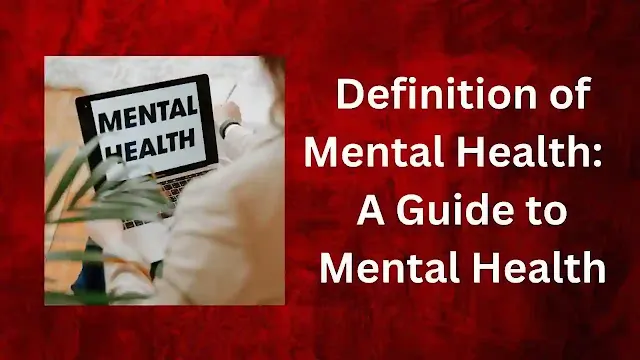Definition of Mental Health: A Guide to Mental Health
Definition of Mental Health: A Guide to Mental Health - Mental health is a crucial component of our overall well-being, encompassing emotional, psychological, and social dimensions that shape our thoughts, feelings, and behaviors. While physical health often takes center stage in health discussions, mental health is equally vital.
This guide explores what mental health is, its
importance, common mental health disorders, and strategies for promoting mental
well-being.
Learn About Mental Health
The World Health Organization (WHO) defines mental
health as "a state of well-being in which every individual realizes their
own potential, can cope with the normal stresses of life, can work
productively, and is able to contribute to their community." Mental health
goes beyond the absence of mental illness—it is about positive functioning and
effective coping.
Mental health involves several key components:
1. Emotional Well-Being: Refers to how we manage our
emotions and experience joy, sadness, anger, and other feelings in a balanced
way.
2. Psychological Well-Being: Involves our thoughts
and perceptions, including self-esteem, autonomy, and decision-making
abilities.
3. Social Well-Being: Pertains to our ability to
form and maintain healthy relationships. It includes communication skills,
empathy, and navigating social interactions.
Why Mental Health Matters
Mental health influences every aspect of our lives,
from our interactions to how we manage stress and make decisions. Here are a few
reasons why it’s essential:
1. Impact on Physical Health: Mental health and
physical health are closely linked. Poor mental health can lead to physical
conditions like heart disease and diabetes, while chronic illnesses can affect
mental health.
2. Improves Relationships: Good mental health
fosters positive relationships with friends, family, and coworkers, allowing
for effective communication, conflict resolution, and connection.
3. Boosts Productivity: A positive mental state
enhances concentration, critical thinking, and creativity, contributing to success
at work, school, or home.
4. Builds Resilience: Good mental health equips us
to handle stress and adversity. Resilient individuals can bounce back from
challenges and navigate life’s ups and downs.
Common Mental Health Disorders
Despite its importance, mental health can be
compromised by various factors, leading to disorders. According to the National
Institute of Mental Health (NIMH), some common disorders include:
1. Anxiety Disorders: These involve excessive fear
or anxiety. Examples include generalized anxiety disorder, panic disorder, and
social anxiety disorder.
2. Mood Disorders: Characterized by persistent
sadness or mood fluctuations, such as major depressive disorder and bipolar
disorder.
3. Schizophrenia and Psychotic Disorders: These
involve distorted thinking, perception, emotions, and behavior, often with
delusions and hallucinations.
4. Personality Disorders: Long-term patterns of
behavior and inner experiences that differ significantly from cultural
expectations, such as borderline and narcissistic personality disorders.
5. Eating Disorders: Disorders like anorexia,
bulimia, and binge-eating disorder involve unhealthy eating patterns and preoccupations
with body image.
6. Post-Traumatic Stress Disorder (PTSD): Develops
after traumatic experiences, marked by flashbacks, nightmares, and severe
anxiety.
Promoting Mental Health and Well-Being
Here are some strategies to support mental
well-being:
1. Exercise Regularly: Physical activity can improve
mood and reduce anxiety and depression. Aim for at least 30 minutes of moderate
exercise most days.
2. Eat Healthily: A balanced diet with fruits,
vegetables, whole grains, and lean proteins can boost mood and energy levels.
Omega-3 fatty acids and antioxidants are particularly beneficial for brain
health.
3. Get Quality Sleep: Good sleep hygiene and a
consistent routine are essential for mental health. Aim for 7-9 hours of sleep
each night.
4. Practice Mindfulness and Meditation: These can
reduce stress, enhance emotional regulation, and improve mental clarity.
5. Maintain Social Connections: Cultivating strong
relationships provides emotional support and combats isolation.
6. Seek Professional Help: If you or someone you
know is struggling, reach out to a mental health professional. Therapists,
counselors, and psychiatrists can offer valuable support and interventions.
Last Word
Understanding mental health is key to a fulfilling
life. By recognizing its importance, understanding common disorders, and
embracing strategies to enhance well-being, we can improve our emotional,
psychological, and social health.
Prioritizing mental health not only enhances our quality of life but also allows us to contribute positively to our communities. Mental health is more than the absence of illness—it’s a state of well-being that empowers us to thrive.
Also Read: What is Mental Health: A Complete Guide



-(1).jpg)


